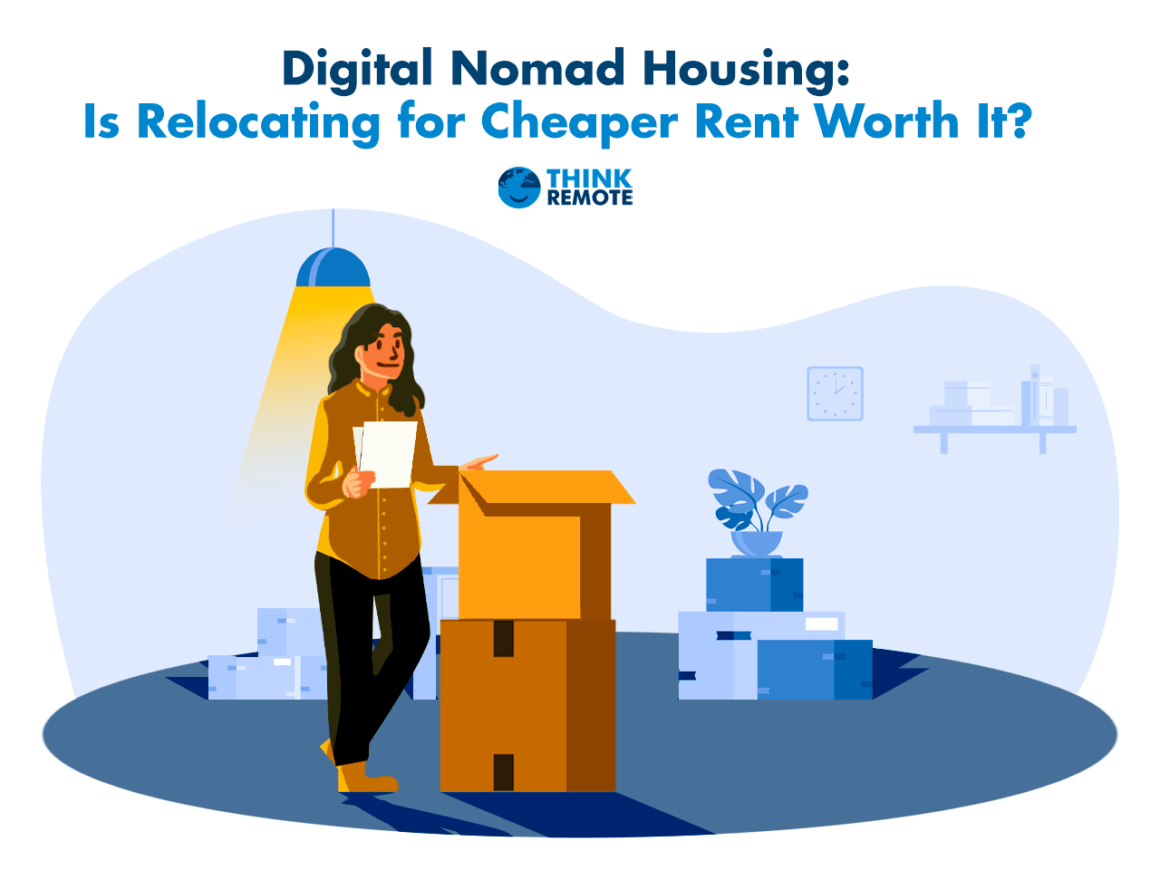As remote work becomes more prevalent, the idea of moving to a less expensive location is becoming more attractive. This trend is on the rise around the world, especially among digital nomads whose budgets are severely strained by housing costs.
However, moving solely for rent savings isn’t always as glamorous as it seems. It’s important to consider several factors before moving to make a well-informed decision and ensure that your financial savings don’t come at the expense of your emotional well-being. If you’re considering a move for housing cost reasons, there are some important points to keep in mind.
Key Things to Consider When Relocating as a Digital Nomad
1. Safety and Security
To ensure a successful move to a place with lower rental rates, it’s important to consider the safety of the country in general and the neighborhood in particular. Crime rates and safety statistics for the area should be researched in advance to ensure a pleasant experience.
The condition and construction quality of the house should also be checked to avoid potential safety risks. In addition to the safety aspects, as a digital nomad, you also have to make sure that the accommodation you rent is suitable for remote work.
2. Tax Policies
If you’re thinking about moving to save on rent, be aware that there can be significant tax differences when moving across international borders or within a country.
In the United States, for example, the income tax system is complex and multi-layered, with taxes at the federal, state, and sometimes local levels. While federal and state income taxes levy a percentage on taxable income, there are wide differences in tax rates and their application, as well as in the types of income subject to tax and the deductions and tax breaks allowed.
Tax friendliness can also vary greatly from country to country, and on some digital nomad visas, remote workers’ earnings aren’t taxable. Therefore, it’s important to know your tax obligations in both your home country and the country you’re moving to. By consulting with a tax advisor or lawyer, you can ensure that you know all the tax requirements and won’t be surprised by unexpected taxes.
3. Costs Beyond Rent
When looking for affordable housing, keep in mind that rent is only one piece of the puzzle. Depending on the state, province, county, or city you choose, there can be significant differences in costs and amenities. That’s why it’s important to find out the average cost of living in your desired location. To get an idea of what to expect, online search engines like Google can be very helpful.
It’s also important to consider your lifestyle. Factors such as hobbies, sports, childcare, and medical care should be considered before you make a final decision. If you have any dietary restrictions, it’s also important to find out if there are any suitable restaurants in the area that fit your budget. By considering all of these factors, you can get a better idea of the actual cost of living in a particular location and avoid unforeseen expenses.
4. Commuting Issues
Another point to consider is your commute. Will it be a long and expensive commute to places you’ll visit daily, such as co-working spaces? Is there reliable public transportation?
If you plan to move to a place where owning a car is a necessity, such as a rural area or suburb where public transportation is scarce, remember that in addition to the initial cost of buying a car, there are ongoing expenses that can have a significant impact on your cost of living. These include expenses like insurance, gas, parking, and maintenance that add up over time.
Also, keep in mind that while owning a car may not be necessary for some areas, your lifestyle may require the convenience and flexibility of having your own vehicle, especially if you like to go to nature preserves or outdoor activities on the weekends.
So consider your lifestyle and research transportation options and costs before you move to avoid unexpected expenses and make the most of your new place of residence.
5. Quality of Life
You also need to think about the quality of life you can enjoy in your new home, particularly if you’re traveling with a family. In addition to public transportation, this includes the availability and quality of infrastructure and services such as Internet connectivity, healthcare, schools, recreational facilities, co-working spaces, and more.
All of these things can have a big impact on your overall happiness and well-being. That’s why it’s important to do your research and make sure you find everything you need in your new community.
6. Traveling Back Home
If you’re moving to a new place with lower housing costs, it’s important to consider the cost of visiting your higher-cost-of-living hometown where your family may live. The distance you must travel will determine the associated costs, which can range from a small expense to multiple plane tickets. You’ll also need to factor in the cost of housing and transportation when you return.
Many digital nomads manage to reduce their travel costs by traveling in the off-season and avoiding major holidays and school vacations. Train travel or longer but less frequent visits are also budget-friendly options. Being well prepared, both financially and emotionally, will help you make the most of your trips home.
7. Emotional costs
If you’re contemplating a move to a place with lower rents, you should also consider the emotional costs of being away from family and friends. Moving to a new place can take a toll on your mental health, and being away from a support system can make it even more difficult.
It’s important to develop the necessary skills and the right mindset to manage the emotional stress that comes with relocation. This includes being open to new experiences and maintaining a strong support network, both online and offline.
Wrapping Up
Overall, moving to a new location with lower housing costs can be a great opportunity for digital nomads to explore new places and enjoy a more affordable lifestyle. But safety, tax policies, costs beyond rent, commuting issues, quality of life, travel costs, and emotional costs are some important factors to consider when making such a decision.
Thorough research and advice from professionals can help you make an informed decision that prioritizes your financial savings without compromising your emotional and mental well-being.






